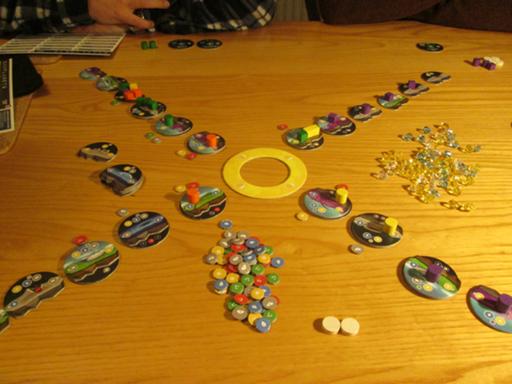ExoPlanets,
designed by Przemysław Świerczyński, is a tile-placement game of
developing life on alien planets for 2-4 players.
Play is fairly simple: draw two planets from the bag and discard
one, or take a planet off one of the discard piles. Place it on a
space tile (which gives you resources), and take that tile into your
hand. Then, as often as you like, create or promote life (which costs
resources); claim goals on space tiles from your hand; or discard
those tiles for an immediate effect, which brings various bad things
closer.

It's not a hugely complex game, but the devils are in the details.
Immediate effects can be as simple as "take two resources"; or they
may be "every planet in this orbit now needs an extra Gas for the
creation of life". Scoring is one per life cube, multiplied by the
basic resource cost of creating that life, but if you get up to four
cubes you replace them with a "species" cylinder that's worth a basic
five. There's a fair bit to keep track of; the game claims a playing
time of 30 minutes, but I think this is extremely optimistic. A first
game, with four reasonably experienced boardgamers, took around two
hours, though it'll certainly be quicker next time. There are plenty
of opportunities for a player to hold up the game by thinking over his
options, at multiple points during his turn (for example, you only
find out what new star tile you've drawn after you've placed a
planet, which in itself is a decision requiring thought).
There are translation and layout problems too. The yellow, clear and
pale blue "crystals" (for energy, gas and water) are sometimes hard to
distinguish from each other, especially on a yellowish table. The
goals on the star tiles are only named rather than laid out in detail,
and one has to look up a player reference card to get the specific
rules (this is mostly to make the game language-independent, but it
makes it harder to keep track of what you're trying for). The icons
and type are frankly a bit small for ageing gamers to see readily.
"Species" is an odd choice of name for the highest form of life you
can create, and "stimulation" as a side-effect of life-creation
doesn't seem to make sense at all. And is it legitimate to reduce the
cost of creating life on a planet to zero? I think I may well write up
a rules sheet in more idiomatic English, or a player reference card.
In spite of that, though, I rather enjoyed it. It's clearly in the
eurogame style, but doesn't follow that mould slavishly: there are
plenty of opportunities for messing up other players, and few chances
to recover. With a strict limit of five turns per player, there isn't
much scope for building up a strategy, particularly since the goals
are typically worth two or three points each where high-value life
might easily be worth six or ten.
Perhaps there's more luck involved than I'd ideally like, but I
definitely want to keep playing this.
Comments on this post are now closed. If you have particular grounds for adding a late comment, comment on a more recent post quoting the URL of this one.